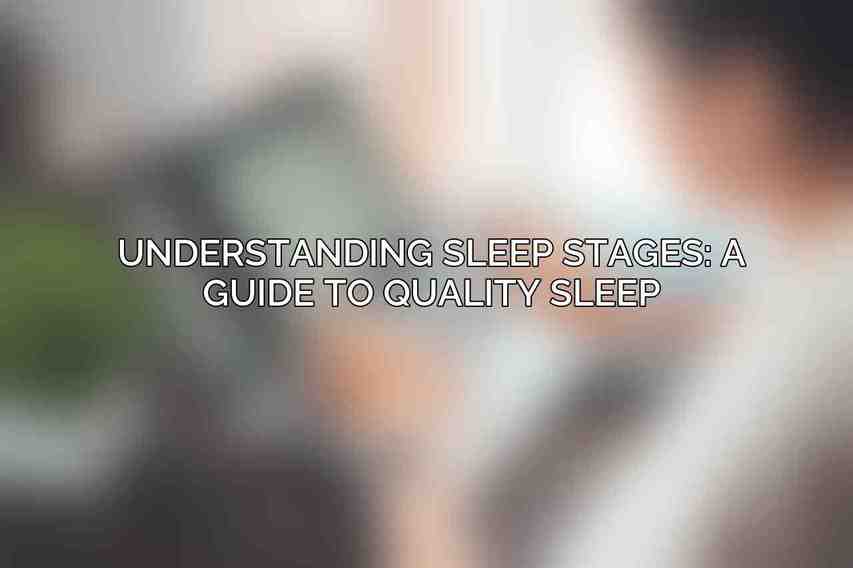Sleep plays a crucial role in our overall health and well-being, yet many of us overlook the importance of quality sleep. Understanding the different sleep stages can provide valuable insights into our sleep patterns and help us improve the quality of our rest. This guide will delve into the various sleep stages, the benefits of optimal sleep, tracking sleep stages with the Fitbit Charge 6, analyzing sleep data, and tips for optimizing sleep quality.
Importance of Understanding Sleep Stages:Understanding sleep stages is essential for assessing the quality of our sleep and identifying any potential issues that may be affecting our rest. By recognizing the different stages of sleep, individuals can gain insight into their sleep patterns and make necessary adjustments to improve sleep quality.
Benefits of Optimal Sleep:Optimal sleep offers a wide range of benefits, including enhanced cognitive function, improved mood regulation, better immune function, and overall physical health. Quality sleep plays a vital role in maintaining our overall well-being and productivity throughout the day.
Sleep Stages

A. Non-rapid Eye Movement (NREM) Sleep
Stage 1: This initial stage marks the transition from wakefulness to sleep. Brain waves begin to slow down, and muscle activity decreases.
Stage 2: Light sleep characterized by sporadic muscle movements and eye activity. This stage helps the body prepare for deep sleep.
Stage 3: Deep sleep where slow brain waves dominate, and the body undergoes restoration and repair. Delta waves are prominent during this stage.
B. Rapid Eye Movement (REM) Sleep
- REM sleep is distinguished by rapid eye movements, vivid dreams, and heightened brain activity. It is crucial for cognitive function, emotional regulation, and memory consolidation.
III. Tracking Sleep Stages with Fitbit Charge 6
A. Features of the Fitbit Charge 6
The Fitbit Charge 6 is equipped with an advanced sleep tracking algorithm that provides detailed insights into sleep stages and quality.
It features an SpO2 sensor for monitoring blood oxygen levels during sleep, offering a comprehensive view of overall health.
The device also includes heart rate monitoring capabilities, allowing users to track their cardiac health and its impact on sleep patterns.
B. Using the Fitbit Charge 6 to Track Sleep Stages
Wear the Fitbit Charge 6 device during sleep to accurately track sleep stages and patterns.
Set up the sleep tracking feature on the Fitbit app to start monitoring sleep duration, stages, and overall sleep quality.
Identify trends, and make informed decisions to improve sleep quality.
Analysis of Sleep Data
A. Duration of Each Sleep Stage
Understanding the time spent in each sleep stage provides insights into sleep quality and potential issues affecting rest.
B. Sleep Efficiency
Sleep efficiency measures the percentage of time spent in bed asleep, reflecting how effectively an individual transitions through sleep stages.
C. Sleep Disturbances
Monitoring sleep disturbances such as awakenings and restlessness can highlight disruptions in sleep patterns that impact overall sleep quality.
Stay tuned for ways to optimize your sleep quality in the next sections…
Frequently Asked Questions
What are the different stages of sleep?
There are five stages of sleep: stages 1, 2, 3, 4, and REM (rapid eye movement) sleep.
How does each sleep stage contribute to overall sleep quality?
Each stage of sleep plays a role in the overall quality of sleep. NREM stages help with physical restoration and growth while REM sleep is crucial for cognitive function and memory consolidation.
What happens during REM sleep?
During REM sleep, your brain is highly active, and this is when most of your dreams occur. REM sleep is essential for emotional regulation, memory processing, and overall mental well-being.
How can one improve the quality of each sleep stage?
Maintaining a consistent sleep schedule, creating a relaxing bedtime routine, and ensuring a comfortable sleep environment can all help improve the quality of each sleep stage.
What are some common sleep disorders that can impact sleep stages?
Some common sleep disorders that can disrupt sleep stages include insomnia, sleep apnea, narcolepsy, and restless leg syndrome. It’s important to seek medical advice if you suspect you have a sleep disorder.

